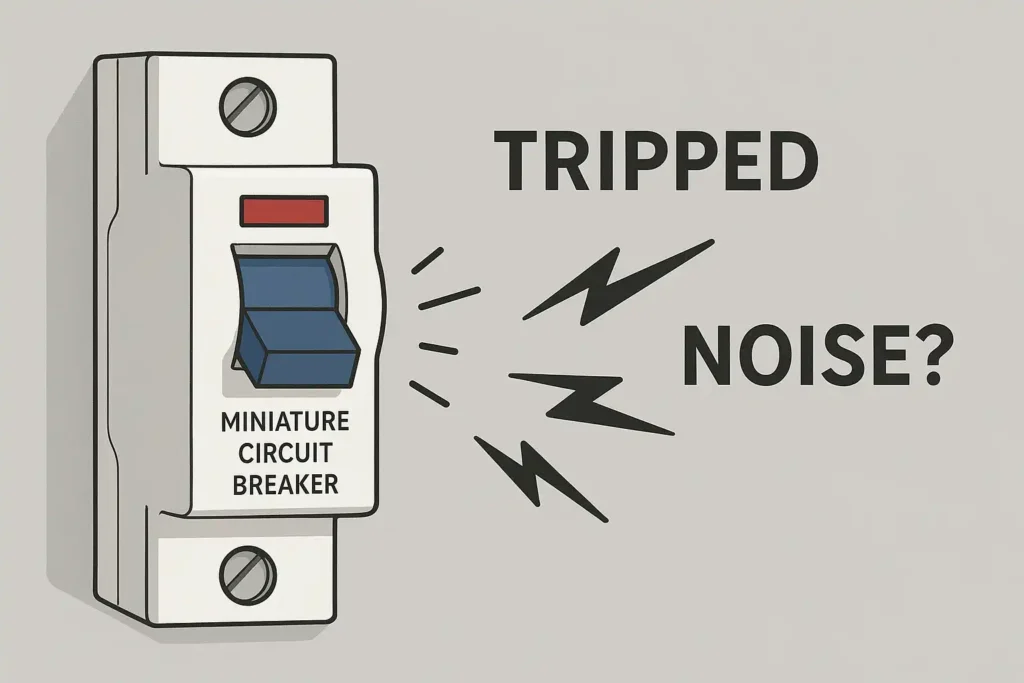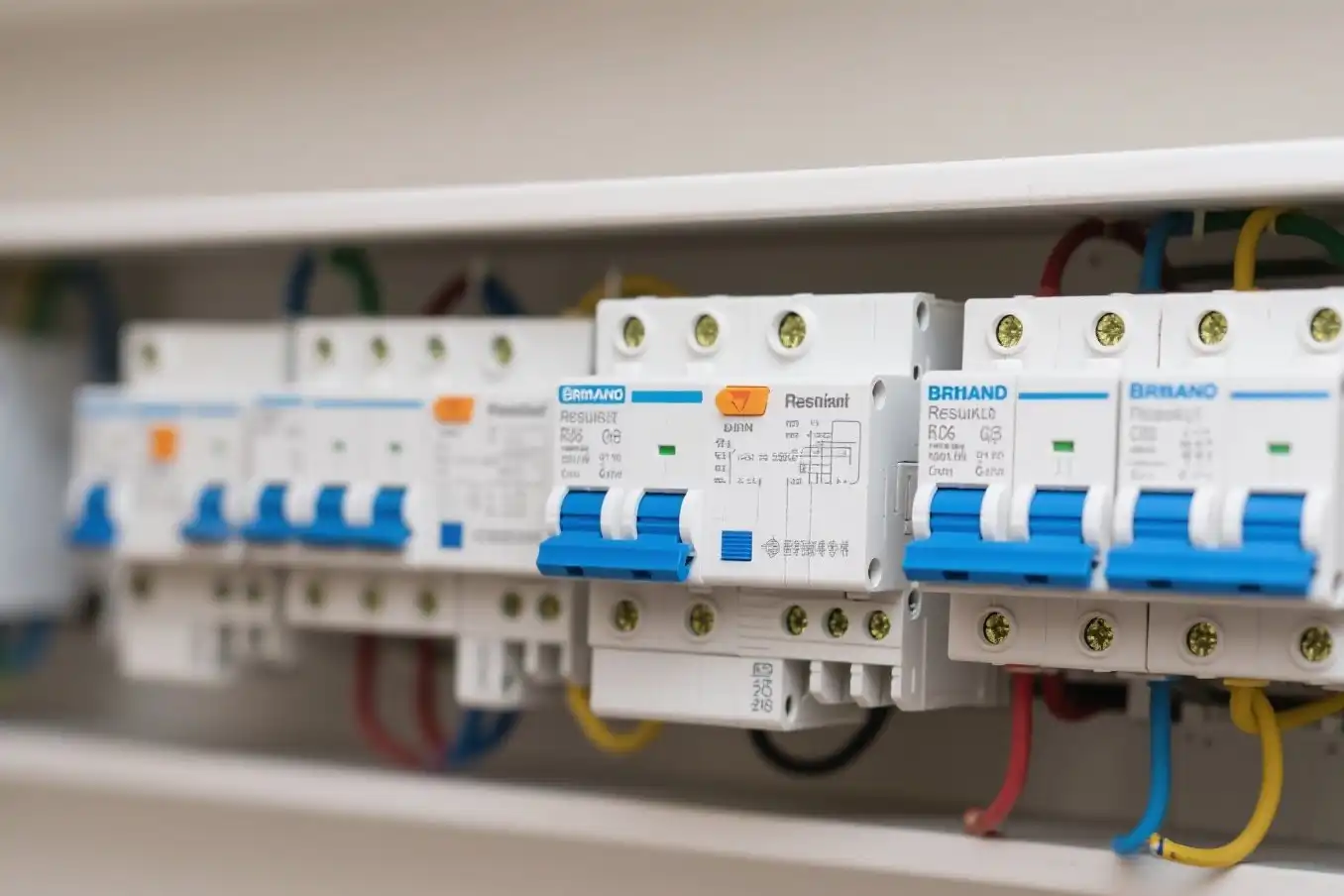The miniature circuit breaker tripped. You might hear a quick click or a soft pop when this happens. These sounds usually mean the breaker is working as it should. If you notice a buzzing, crackling, or loud pop, this could signal a problem. Each sound has a meaning. Some noises are normal, but others warn you about danger. Always pay attention to what you hear.
Key Takeaways
- A fast click or gentle pop means the breaker works right and you do not need to worry.
- Buzzing, crackling, loud pops, or hissing sounds warn about electrical problems that need quick help.
- Overloads, bad breakers, and wiring problems make warning noises that show dangers like fire or shock.
- If you hear warning sounds, turn off the main power and call a licensed electrician to check and fix the problem.
- Stop problems by not overloading circuits, looking for signs of damage, and having an electrician check things often.
The miniature circuit breaker tripped
Normal Sounds
When the miniature circuit breaker tripped, you might hear some usual noises. These sounds show the breaker is working right. You do not need to worry if you notice these:
- Clicking: You may hear a quick click when the breaker trips. This sound comes from the inside parts moving fast to stop the circuit.
- Soft Popping: Sometimes, a soft pop happens as the breaker shuts off. This is normal and shows the breaker is stopping too much current.
- Quiet Hum: A low hum can happen when the breaker is working, especially if it has a load. This sound is usually not a problem.
Tip: If you only hear a quick click or soft pop when the miniature circuit breaker tripped, you can trust the breaker is working right.
Scientists have studied the sounds that happen when the miniature circuit breaker tripped. They used special tools to check the vibrations and found each part makes its own sound. These noises change if the breaker is in good shape or not. For example, a good breaker makes a clear click or pop, but an old one might sound different.
Warning Sounds
Some noises mean there is a problem when the miniature circuit breaker tripped. You should listen closely if you hear any of these:
- Buzzing: A steady or loud buzz can mean a loose wire or a problem inside. This noise often means something needs to be fixed.
- Loud Popping: If you hear a very loud pop, it could mean a short circuit or a big problem. This is not normal and can be dangerous.
- Crackling: Crackling sounds may come from sparks inside the breaker. This can happen if the contacts are broken or worn out.
- Hissing: A hissing noise might mean there is too much heat or the insulation is breaking down. This can cause a fire risk.
| Failure Mode / Noise Signature | Description |
|---|---|
| Inconsistent Tripping | Breaker trips with normal use or does not trip during problems, showing it is not working right. |
| Unusual Sounds | Buzzing, clicking, or grinding noises during use showing something is wrong inside. |
| Visible Damage | Burn marks, cracks, or bent parts show too much heat or damage. |
| Mechanical Wear | Using the breaker a lot can wear out springs and latches, making strange noises. |
| Contact Erosion | Sparks can wear down contacts, making the breaker work less well. |
When the miniature circuit breaker tripped and you hear any of these warning sounds, do not ignore them. These noises often mean there is a problem inside the breaker or in your wires. Problems like these can come from too much power, faults, or broken parts. If you notice any of these warning signs, you should act fast to stay safe.
Noise Meaning
When you hear noises after the miniature circuit breaker tripped, each sound can tell you something important about your electrical system. Understanding these sounds helps you know what is happening and what you should do next.
Overload
An overload happens when too many devices draw power from the same circuit. You might hear a buzzing noise before the breaker trips. This buzzing means the breaker is struggling to handle the extra current. Sometimes, the buzzing lasts for a second or two, then you hear a popping sound as the breaker finally trips. The popping noise shows the breaker has stopped the flow of electricity to protect your home.
- Buzzing often points to:
- Too many devices plugged in
- Loose wires causing arcing
- The breaker under stress but not tripping right away
Note: Buzzing and popping are not normal when the miniature circuit breaker tripped. These sounds warn you about overload or wiring problems. You should unplug some devices and check if the breaker resets.
Faulty Breaker
A faulty breaker can make different noises than a healthy one. You may notice crackling, grinding, or even a loud pop. Scientific studies show that faulty breakers have unique sound patterns. These patterns help experts tell if a breaker is damaged or worn out. If you hear strange or new noises, your breaker may not work as it should.
- Signs of a faulty breaker:
- Crackling or grinding sounds
- Breaker trips for no clear reason
- Breaker feels hot or looks damaged
Callout: If you suspect a faulty breaker, you should replace it soon. Faulty breakers can fail to protect your home from electrical dangers.
Electrical Issues
Electrical issues in your wiring or devices can also cause noises when the miniature circuit breaker tripped. Hissing, crackling, or loud popping may mean there is a short circuit or damaged insulation. These sounds often come from sparks or heat inside the breaker or wires.
- Common causes:
- Short circuits from damaged wires
- Loose connections
- Worn-out insulation
Tip: If you hear hissing or crackling, turn off the power and call an electrician. These noises can signal a fire risk.
Each noise gives you a clue about what is wrong. Buzzing and popping often mean overload. Crackling or grinding points to a faulty breaker. Hissing or loud popping can mean serious electrical problems. When you hear any of these, take action to keep your home safe.
What to Do
Safety Steps
When you hear unusual noises after the miniature circuit breaker tripped, you need to act quickly and safely. Start by turning off the main power supply. This step keeps you safe from electric shock. Always use a voltage tester to check that no electricity flows in the wires before you touch anything. Wear insulated gloves, goggles, and rubber shoes to protect yourself.
Follow these steps if you hear buzzing, crackling, or popping:
- Turn off the main power supply.
- Use a voltage tester to confirm the power is off.
- Do not open the electrical panel yourself. Live wires inside can be very dangerous.
- Cut power to non-essential circuits if you can do so safely.
- Contact a licensed electrician right away.
⚠️ Tip: Never try to fix or open the breaker panel on your own. Only professionals should handle repairs inside the panel.
When to Call an Electrician
You should call an electrician if you notice any of these warning signs:
- The miniature circuit breaker tripped and you hear loud buzzing, sizzling, or sparking.
- You smell burning or see scorch marks near the panel.
- The breaker trips often or will not reset.
- Lights flicker or outlets feel warm.
A professional will inspect the panel, check for loose wiring, and test the breaker. Electricians use special tools to find the cause of the noise. They may replace faulty breakers or improve grounding and wiring. These steps help prevent fires and keep your home safe.
| Cause | Signs | Risks |
|---|---|---|
| Loose wiring | Burning smell, sparks | Fire, shock |
| Overloaded circuits | Breaker trips, dim lights | Overheating, fire |
| Faulty circuit breaker | Buzzing, won’t reset | Fire, malfunction |
Preventing Issues
You can prevent problems with your circuit breaker by following a few simple habits:
- Do not overload outlets or circuits with too many devices.
- Check for signs of wear, like flickering lights or warm outlets.
- Schedule regular inspections by a licensed electrician.
- Ask your electrician about installing ground noise filters if you have frequent noise issues.
- Replace old or damaged breakers as soon as possible.
Regular checks and quick action help you avoid bigger problems when the miniature circuit breaker tripped. Staying alert to sounds and smells keeps your home safe.
When the miniature circuit breaker tripped, you may hear a click or a soft pop. These sounds are normal and show the breaker is working. But if you hear buzzing, crackling, or a loud pop, this is not safe. Strange noises can mean something is wrong. You should always get help from a licensed electrician if you hear warning sounds.
Remember: Electrical safety keeps you and your home safe.
FAQ
What should you do if your breaker keeps tripping?
You should unplug some devices and try resetting the breaker. If it trips again, you may have an overload or a wiring problem. Call a licensed electrician to check your system.
What noise is normal when a miniature circuit breaker trips?
You may hear a quick click or a soft pop. These sounds mean the breaker is working as it should. You do not need to worry about these noises.
What does a buzzing sound from the breaker mean?
A buzzing sound often means a loose wire or an overloaded circuit. This noise is not normal. You should turn off the power and contact an electrician for help.
What signs show your breaker needs replacing?
Look for these signs:
- Frequent tripping
- Loud popping or crackling
- Breaker feels hot
- Visible damage or burn marks
If you notice any of these, you should replace the breaker soon.
The following information may be of interest to you
Why a circuit breaker makes a buzzing sound
How to Minimize Electromagnetic Interference in Solar Inverter Systems
Why Won’t My Circuit Breaker Reset and What Can I Do?
What are the detection methods for circuit breakers




